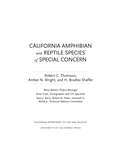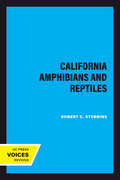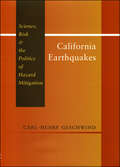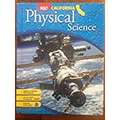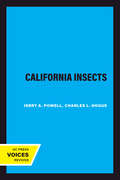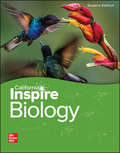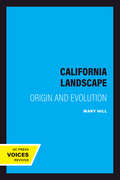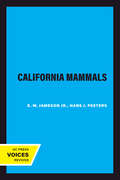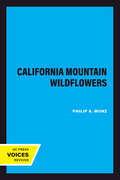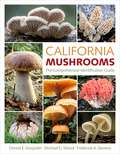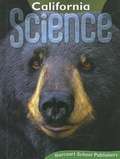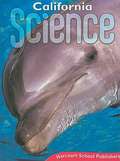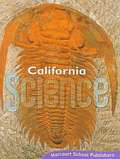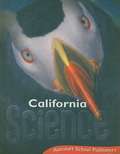- Table View
- List View
California Amphibian and Reptile Species of Special Concern
by Robert C. ThomsonOne of the most important hotspots of herpetological biodiversity in the United States, California is home to many endemic amphibians and reptiles found nowhere else on earth. Many of these taxa have unique ecological and morphological specializations, and their management is an important conservation challenge. Increasing climate change impacts, human development, and extreme drought mean many of these species face an ever-greater risk of extinction. California Amphibian and Reptile Species of Special Concern provides an up-to-date synthesis of the current state of knowledge regarding the biology and conservation risks faced by 45 of California's most sensitive amphibian and reptile species. With the goal of enhancing management based on the best available science, the authors developed a novel set of risk metrics to identify special concern species and the threats they face, including population declines, range size and restrictions, and ecological specializations and niche restrictions. In addition to detailed species accounts, this book provides a quantitative analysis of the conservation status and pressing management issues facing individual species and the state's amphibian and reptile fauna as a whole. The volume focuses on identifying threats, concrete recommendations for management and recovery, and future research needs. The text is complemented by detailed distribution maps, color photos, and graphs. Written in nontechnical language, California Amphibian and Reptile Species of Special Concern will be a valuable resource to a broad range of users from resource managers, field biologists, and academic herpetologists to students and recreational naturalists. Published in association with the California Department of Fish and Wildlife.
California Amphibians and Reptiles: Revised Edition (California Natural History Guides #31)
by Robert C. StebbinsThis title is part of UC Press's Voices Revived program, which commemorates University of California Press’s mission to seek out and cultivate the brightest minds and give them voice, reach, and impact. Drawing on a backlist dating to 1893, Voices Revived makes high-quality, peer-reviewed scholarship accessible once again using print-on-demand technology. This title was originally published in 1972.This title is part of UC Press's Voices Revived program, which commemorates University of California Press’s mission to seek out and cultivate the brightest minds and give them voice, reach, and impact. Drawing on a backlist dating to 1893, Voices Revived</DIV
California Ciencias: Student Edition Grade 5 2008 (Harcourt School Publishers)
by Harcourt School Publishers HspCalifornia Earth Science Middle School
by Macmillan Mcgraw-HillScience is a way of understanding the world around us. The work of scientists often begins when scientists ask questions about something they observe. Asking and answering questions Is the basis of inquiry.
California Earthquakes: Science, Risk, and the Politics of Hazard Mitigation
by Carl-Henry GeschwindWinner of the Book Prize of the Forum for the History of Science in America from the History of Science SocietyIn 1906, after an earthquake wiped out much of San Francisco, leading California officials and scientists described the disaster as a one-time occurrence and assured the public that it had nothing to worry about. California Earthquakes explains how, over time, this attitude changed, and Californians came to accept earthquakes as a significant threat, as well as to understand how science and technology could reduce this threat.Carl-Henry Geschwind tells the story of the small group of scientists and engineers who—in tension with real estate speculators and other pro-growth forces, private and public—developed the scientific and political infrastructure necessary to implement greater earthquake awareness. Through their political connections, these reformers succeeded in building a state apparatus in which regulators could work together with scientists and engineers to reduce earthquake hazards. Geschwind details the conflicts among scientists and engineers about how best to reduce these risks, and he outlines the dramatic twentieth-century advances in our understanding of earthquakes—their causes and how we can try to prepare for them.Tracing the history of seismology and the rise of the regulatory state and of environmental awareness, California Earthquakes tells how earthquake-hazard management came about, why some groups assisted and others fought it, and how scientists and engineers helped shape it.
California Focus on Physical Sciences InterActive Reader
by Mcdougal LittellFocuses on Physical Science -- the Interactive Reader makes reading science fun, exciting and easy to read
California HMH Science Dimensions™, Designated ELD: The Living Earth, Student Workbook
by Houghton Mifflin HarcourtNIMAC-sourced textbook
California Insects: Second Edition (California Natural History Guides #44)
by Jerry A. Powell Charles L. HogueCalifornia has a vast number of insect species: estimates run 30,000-35,000 or more, and even in the better known groups, new species occasionally are discovered. This volume is the first attempt in more than half a century to summarize knowledge of this rich insect fauna, and the first work ever to provide a field guide for beginning students, and the nonspecialist reader. It selects about 600 of the more characteristic kinds of insects to represent the huge variety known. Most of these are conspicuous kinds often noticed in cities or in natural areas by gardeners, hikers, fishermen, etc. For each insect, distinguishing features of its appearance, features of its biology, and its geographical distribution in California are summarized: and an illustration (photograph or drawing) is given of the adult or some other stage.California Insects will serve as a convenient, compact introduction to the identification and understanding of these often strange and fascinating creatures. Used with other information sources cited in the text, it provides the student, collector, or naturalist a means of efficiently developing knowledge of specialized groups of insects.
California Inspire Biology
by McGraw Hill EducationThe Inspire High School Series brings phenomena to the forefront of learning to engage and inspire students to investigate key science concepts through their three-dimensional learning experience. Start exploring now! Inspire Curiosity - Inspire Investigation - Inspire Innovation.
California Landscape: Origin and Evolution (California Natural History Guides #48)
by Mary HillThis title is part of UC Press's Voices Revived program, which commemorates University of California Press’s mission to seek out and cultivate the brightest minds and give them voice, reach, and impact. Drawing on a backlist dating to 1893, Voices Revived makes high-quality, peer-reviewed scholarship accessible once again using print-on-demand technology. This title was originally published in 1984.
California Mammals (California Natural History Guides #52)
by E. W. Jameson Jr. Hans J. PeetersThis title is part of UC Press's Voices Revived program, which commemorates University of California Press’s mission to seek out and cultivate the brightest minds and give them voice, reach, and impact. Drawing on a backlist dating to 1893, Voices Revived makes high-quality, peer-reviewed scholarship accessible once again using print-on-demand technology. This title was originally published in 1988.This title is part of UC Press's Voices Revived program, which commemorates University of California Press’s mission to seek out and cultivate the brightest minds and give them voice, reach, and impact. Drawing on a backlist dating to 1893, Voices Revived</DIV
California Mountain Wildflowers
by Philip A. MunzThis title is part of UC Press's Voices Revived program, which commemorates University of California Press’s mission to seek out and cultivate the brightest minds and give them voice, reach, and impact. Drawing on a backlist dating to 1893, Voices Revived makes high-quality, peer-reviewed scholarship accessible once again using print-on-demand technology. This title was originally published in 1963.
California Mushrooms: The Comprehensive Identification Guide
by Michael G. Wood Dennis E. Desjardin Frederick A. StevensWinner of the CBHL Award of Excellence California is one of the most ecologically rich and diverse regions of North America, and home to hundreds of species of mushrooms. In California Mushrooms, mycologist experts Dennis Desjardin, Michael Wood, and Fred Stevens provide over 1100 species profiles, including comprehensive descriptions and spectacular photographs. Each profile includes information on macro- and micromorphology, habitat, edibility, and comparisons with closely related species and potential look-alikes. Although the focus of the book is on mushrooms of California, over 90% of the species treated occur elsewhere, making the book useful throughout western North America. This complete reference covers everything necessary for the mushroom hunter to accurately identify over 650 species.
California Science
by Dinah Zike Jay K. Hackett Richard H. Moyer Joanne Vasquez Mulugheta Teferi Kathryn Leroy Dorothy J. T. Terman Gerald F. WheelerAn introductory science textbook.
California Science
by HarcourtSometimes scientists need to observe objects closely. Certain tools can help them observe details they might not be able to see with just their eyes. A hand lens makes things look larger than they are. It magnifies them. Hold the lens a few centimeters in front of your eye. Then move the object closer to the lens until you can see it clearly. Never let the lens touch your eye. Never use it to look at the sun!
California Science
by Harcourt School PublishersThis edition, a definitive guide for students, contains topics which include Earth's Changing Crust, Weathering and Erosion, Movement of Head, Energy Transfer and Weather and Ecosystems, etc.
California Science
by Houghton MifflinA scientific textbook designed in a way that you can read on your own. Covering the following areas Unit A: Survival of Living Things. Unit B: Patterns in the Sky Unit C: Matter. Unit D: Energy.
California Science
by Jay K. HackettScience is a way of understanding the world around us. The work of scientists often begins when scientists ask questions bout some thing they observe. Asking and answering questions in the basis of inquiry.
California Science (Grade #3)
by Jay K. HackettThe California Science Grade 3 covers Life Science, Earth Science and Physical Science.
California Science 2nd Grade
by Jay K. Hackett Richard H. Moyer Joanne Vasquez Mulugheta TeferiThis book covers life, earth and physical science broadly.
